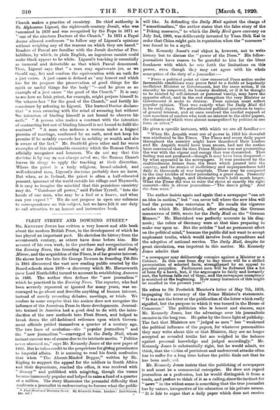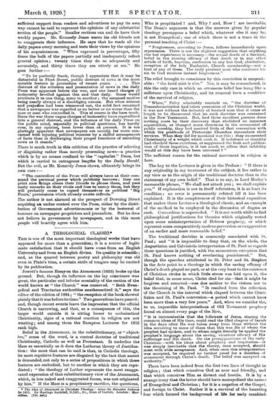FLEET STREET AND DOWNING STREET.*
Ma. KENNEDY JONES has written a very honest and able book about the modern British Press, in the development of which he has played an important part. He sketches its history from the seventeenth century, as others have done before him. His account of his own work, in the purchase and reorganization of the Evening News, the founding of the Daily Mail and Daily Mirror, and the acquisition of the Times, is of far greater interest. He shows how the late Sir George Newnes in founding Tit-Bits in 1881 discovered the vast new reading public created by the Board-schools since 1870—a discovery which Mr. Harmsworth (now Lord Northcliffe) turned to account in establishing Answers in 1888. The author then defines the " new journalism " which he practised in the Evening News. The reporter, who had been severely repressed or ignored for many years, was en- couraged to go about and describe anything of human interest, instead of merely recording debates, meetings, or trials. We confess to some surprise that the author does not recognize the influence of the American Press in these developments. Journal- ists trained in America had a good deal to do with the intro- duction of the new methods into Fleet Street, and helped to break down the old-fashioned reticence upon which Govern- ment officials prided themselves a quarter of a century ago. The two lines of evolution—the " popular journalism " and the "new journalism "—converged in the Daily Mail, whose instant success was of course due to its intrinsic merits. " Politics never obsessed us," says Mr. Kennedy Jones of the new paper of 1896. But he takes credit to the proprietors for giving prominence to Imperial affairs. It is amusing to read his frank confession that when " The Absent-Minded Beggar," written by Mr. Kipling to support the appeal for the soldieri in South Africa and their dependants, reached the office, it was received with " dismay " and published with misgiving, though the verses became immensely popular and helped to raise a fund of a quarter of a million. The story illustrates the perennial difficulty that confronts a journalist in endeavouring to foresee what the public • Fleet Street and Downing Street. By Kennedy Jones. London : Hutchinson. 16s. anti
will like. In defending the Daily Mail against the charge of " sensationalism," the author states that the false story of the " Peking massacre," to which the Daily Mail gave currency on July 2nd, 1900, was deliberately invented by Yuan Shih Kai in order that China might gain in reputation when the " massacre " was found to be a myth.
Mr. Kennedy Jones's real object is, however, not to write history but to discuss the " power of the Press." His fellow- journalists have reason to be grateful to him for the blunt
frankness with which he sets forth the limitations on this power, even though they may not agree with his whole conception of the duty of a journalist :— " From a political point of view concerted Press action under favourable conditions may prove fatal to a feeble or hopelessly inefficient Minister or Government, but the same action, if its sincerity be suspected, its honesty doubted, or if it be thought to be tainted by self-interest or personal vanity, may have the opposite effect, and in the end strengthen the very Minister or GoVerrunent it seeks to destroy. Press opinion must reflect popular opinion. That was exactly what the Daily Mail did in its early days. We subordinated political questions to topics of general interest, and at once received the cordial support of vast numbers of readers who took no interest in the older papers, the columns of which were almost monopolized by politics in one form or other."
He gives a specific instance, with which we are all familiar :- " When Mr. 4squith went out of power in, 1916 his downfall was attributed to the Times. The Times and every daily paper throughout the country might have thundered their loudest and Mr. Asquith would have been secure, had not the nation been convinced that its then Prime Minister was not prosecuting the war with the vigour and energy that was demanded. That feeling was not produced—though it may have been deepened— by what appeared in the newspapers. It was produced by the multitudinous letters from the front which poured into the country, and the stories of inefficiency And unpreparedness told daily in thousands of war hospitals. These may be compared to the tiny trickles of water percolating a great dean. Presently it gets sodden, bulges, and obviously won't hold much longer. What the Times did was to raise the shout at exactly the right moment—this is clever journalism= The dam's going.' And the dam went."
The author insists again and again that a newspaper "can set an idea in motion," but " can never tell where the new idea will lead the person who entertains it." He recalls the vigorous articles which Mr. Blatchford, after attending the German manceuvree of 1909, wrote for the Daily Mail on the "German Menace." Mr. Blatchford was perfectly accurate in his diag- nosis ; the rulers of Germany were at that time preparing to make war upon us. But the articles " had no permanent effect on the political mind," because the public did not want to accept
unpleasant truths, which would involve fresh expenditure and the adoption of national service. The Daily Mail, despite its great circulation, was impotent in this matter. Mr. Kennedy
Jones admits that
" a newspaper may deliberately conspire against a Minister or a Cabinet. In this case from day to day there will be a skilled presentation of selected facts, strengthened by an appeal to popular prejudice. Parliament men trill be fluttered like a lot of hens by a hawk, but, if the arguments be fairly and instantly met, the bottom falls out of them, and the newspaper conspiracy is scotched at the beginning. How many instances of this might be recalled in the present year."
He refers to Sir Frederick Maurice's letter of May 7th, 1918, impugning the accuracy of the Prime Minister's statements.
" It was not the letter or the publication of the letter which really signified, but the purpose to which it was turned in the House of Commons." The politician who is honest and sincere, says Mr. Kennedy Jones, has the advantage over his journalistic enemies in the long run. He gains by the fierce light of publicity.
The fact that Ministers are " judged as men " has " weakened the political influence of the papers, for whatever personalities they may write about this or that Minister, they are no longer accepted as revealed truths but are weighed in the balance against personal knowledge and judged accordingly." Mr. Kennedy Jones is substantially right, but he would. admit, we think, that the victim of persistent and undeserved attacks often has to suffer for a long time before the public finds out that he
has been malir.-ued.
Mr. Kennedy Jones insists that the publishing of newspapers is and must be a commercial enterprise. He does not regard journalism as a profession, but he would distinguish it from a trade, and prefers to think of it as a calling, since the instinct for "news " in the widest sense is something that the true journalist
has by nature, irrespective of his education or his private means. " It is fair to argue that a daily paper which does not receive
sufficient support from readers and advertisers to pay its own way cannot be said to represent the opinions of any substantial section of the people." Smaller sections can and do have their weekly papers. Mr. Kennedy Jones warns his old friends not to exaggerate their influence. He says that he reads all the daily papers every morning and tests their views by the opinions of his acquaintances. " When expressed in percentages, fifty times the bulk of the papers partially and inadequately reflect general opinion ; twenty times they do so adequately and accurately, and thirty times they are utterly at sea." Ho goes further :—
" To be perfectly frank, though I appreciate that it may be distasteful in Fleet Street, public distrust of news is the most notable feature in journalism of recent years. . . . This distrust of the selection and presentation of news in the daily Press was apparent before the war, and one heard charges of insincerity levelled against this and that daily. Some would attribute it to one thing, some to another ; the assumed motive being nearly always of a disobliging nature. But when animus and prejudice had been winnowed out, the solid fact remained that a newspaper was regarded as no better or no worse than the man or men who controlled it. This of course is the bare truth. Since the war these vague charges of insincerity have crystallized into a general distrust, and the influence of the daily Press on the public: mind, especially in political questions, has hardly ever, in my opinion, been lower than at present. It is too glaringly apparent that newspapers are usually far more con- cerned with injuring political enemies by a skilful arrangement of facts than in discharging their proper functions of recording news as it stands."
There is much truth in this criticism of the practice of selecting or disguising rather than merely presenting news—a practice which is by no means confined to the " capitalist " Press, but which is carried to outrageous lengths by the Daily Herald. But the evil, as Mr. Kennedy Jones shows, ultimately brings its own cure :- " The controllers of the Press will always have at their com- mand thepersonal power which publicity, bestows : they can print nice things about their friends to please them, and pass nasty remarks en their rivals and foes to annoy them. but they will probably cease to regard themselves as political ' Big Fours,' pretensions which already excite ridienle."
The author is not alarmed at the prospect of Downing Street acquiring as undue control over the Press, either by the distri- bution of Govesnment adveLtisements or by the bestowal of honours on newspaper proprietors and journalists. But he does not believe in government by newspapers, and in this most people will heartily agree with him.











































 Previous page
Previous page